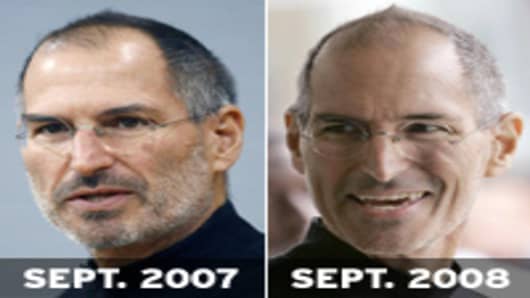Last week, when Steve Jobs announced that his recent weight loss was due to “a hormone imbalance,” I got calls from reporters and others (which, I must admit, I ducked) asking me if that was the medical problem he had confessed to when he and I had had our infamous phone call last summer—the one where he called me a slime bucket and denied that he had a recurrence of cancer. The answer is no, it wasn’t. It was something else—which of course I still can’t disclose because the conversation was off the record.
I said at the time that I knew I was being spun by Mr. Jobs. But I didn’t think I was being lied to. Now, I’m not sure what to think. It is certainly possible that he had the condition he described to me last summer. It is also possible that he did, in fact, have “a hormone imbalance,” as he announced last week, as rumors swirled again about his health. And it is even possible that a few days later he discovered that his problems were “more complex"—whatever that means—and that he only just realized that he needs to take a medical leave. It is possible, in other words, that he and Apple are telling the truth.
Possible—but unlikely. Apple’s stock was hammered in after-hours trading on Thursday because, to be blunt, investors simply don’t believe Mr. Jobs. Charlie Wolf, the Apple analyst at Needham & Company, wrote a note to clients, describing Mr. Jobs’ e-mail to employees, in which he said he was taking a temporary medical leave, as “a can of worms.” He added: “The fact that Mr. Jobs did not resign nor did the board call for his resignation suggests that he may well be telling the truth.” The clear implication of that sentence is that most people (including, perhaps, Mr. Wolf himself) think Mr. Jobs is not telling the truth.
The most indispensable chief executive in the United States, beloved by customers and investors for his magnificent turnaround of the company he founded—and for the amazing gadgets his company produces—can no longer be trusted on the subject of whether he is healthy enough to continue running the company. Although Mr. Jobs says he will return in June, Mr. Wolf wrote in his note that investors were likely to “assume the worst—at the extreme, the possibility that Mr. Jobs will never return to Apple as full-time C.E.O.” And Mr. Wolf has always been a big supporter of Steve Jobs. Incredible.
It is really hard to write about Steve Jobs and his health. Nobody wants to see another human being suffer a recurrence of cancer. Everybody—myself very much included—hopes that Mr. Jobs will get well and come back to work. I can even understand why he doesn’t want to disclose details about his medical problems to the world—it’s very distasteful, and Mr. Jobs also believes strong that it’s nobody’s business except his and his family’s.
But he’s wrong. There are certain people who simply don’t have the same privacy rights as others, whether they like it or not. Presidents. Celebrities. Sports figures. And, at least in terms of his health, Steve Jobs. His health has become a material fact for Apple shareholders. His vagueness about his health, his dissembling, his constantly changing story line—it is simply not an appropriate way to act when you are the most important person at one of the most high-profile companies in America. On the contrary: it is infuriating. (See an interview with Joe Nocera, S&P's Tom Smith and CNBC's Jim Goldman, below.)
Enough is enough. If Apple refuses to talk more openly about Mr. Jobs’s health, it will continue to be “a distraction,” as he himself put it in his e-mail to employees. The time has come for Apple’s board to take control of this subject from Mr. Jobs and do the right thing by the company’s investors. Tell us, once and for all, what is going with Mr. Jobs’s health. Put the subject to rest. End the constant rumor-mongering. And then get back to the business of making the coolest products on earth.


